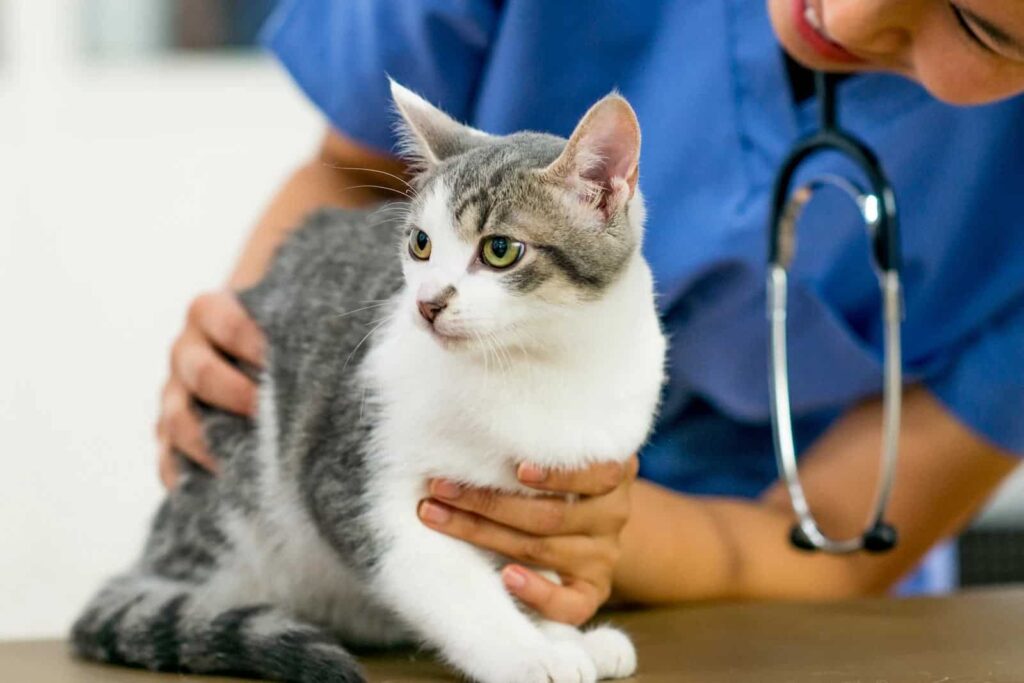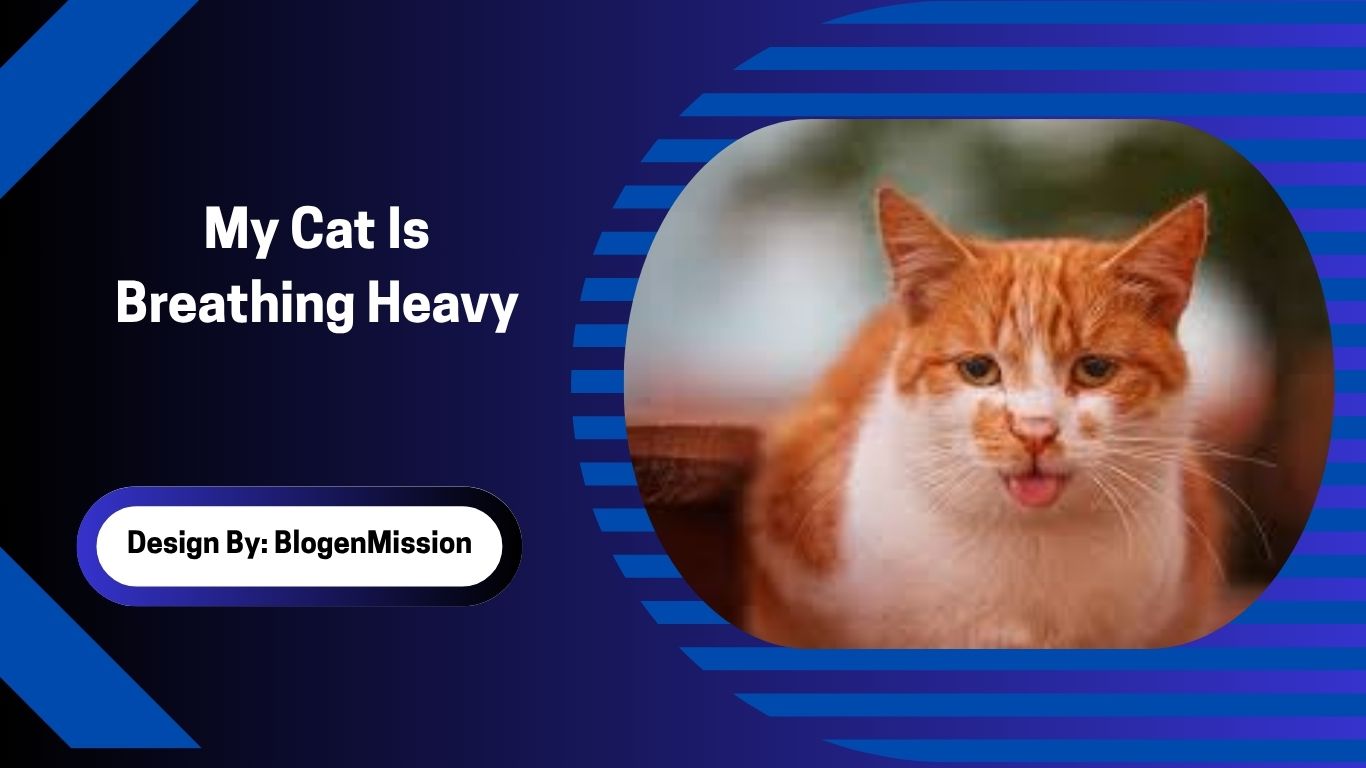If your cat is breathing heavily, it may have asthma, infection, or heart disease. Monitor symptoms, reduce stress, and consult a vet for diagnosis and treatment in 2025.
Noticing my cat is breathing heavy can be alarming for any pet owner. Cat heavy breathing, feline respiratory distress, or cat panting heavily may signal underlying health issues, from minor stress to serious conditions like feline asthma or cat heart disease.
In 2025, with advanced veterinary care and growing awareness of pet respiratory health, understanding the causes, when to seek feline veterinary care, and how to manage cat breathing problems is crucial.
This SEO-optimized guide explores why your cat might be experiencing feline breathing difficulties, when to worry, and actionable steps to take, incorporating the latest feline health trends for 2025.
Common Causes of Cat Heavy Breathing
Cat breathing problems can stem from various causes, ranging from temporary issues to chronic conditions. Here are the most common reasons for cat labored breathing or cat shortness of breath in 2025:
- Feline Asthma: A prevalent cause of cat wheezing or feline respiratory distress, asthma affects 1-5% of cats (per recent veterinary data). Triggers include allergens, stress, or poor air quality, leading to cat allergies breathing issues.
- Cat Respiratory Infection: Feline upper respiratory issues, often caused by viruses like feline herpesvirus or bacteria, result in cat panting heavily or nasal congestion. Symptoms may include sneezing or discharge.
- Cat Heart Disease: Conditions like feline heart failure or hypertrophic cardiomyopathy can cause cat breathing fast while sleeping or after activity due to fluid buildup in the lungs.
- Cat Lung Problems: Cat pneumonia or lung infections can lead to cat respiratory symptoms like labored breathing or coughing, requiring urgent cat breathing vet visit.
- Cat Allergies or Stress: Environmental allergens or anxiety can trigger cat stress breathing solutions, causing temporary cat breathing heavily after playing or during stressful events like vet visits.
If you’re wondering, why is my cat breathing heavily?, monitor for additional cat health symptoms like lethargy, reduced appetite, or coughing. Persistent symptoms warrant a veterinary diagnosis for cat breathing to pinpoint the cause.
When to Seek Veterinary Care for Cat Breathing Problems

Knowing when to worry about cat breathing is critical. Not all cases of cat heavy breathing are emergencies, but certain cat emergency health signs require immediate action. Here’s when to seek emergency vet near me or local feline veterinary services:
- Rapid or Labored Breathing: If your cat shows cat labored breathing or breathes over 40 times per minute at rest (normal is 20-30), contact a nearby cat emergency clinic.
- Open-Mouth Breathing: Cats rarely breathe through their mouths unless in distress. This is a cat breathing emergency signaling feline respiratory distress.
- Blue Gums or Tongue: Cyanosis indicates low oxygen levels, requiring urgent cat breathing help near me.
- Lethargy or Collapse: Combined with cat shortness of breath, this suggests serious conditions like cat heart disease or cat pneumonia.
For non-emergencies, like cat breathing heavily after playing, schedule a cat health checkup to rule out cat chronic health conditions. Search for cat vet cat vet Austin, TX or check X for cat respiratory problems X posts to find trusted feline emergency care tips from local pet owners.
Home Tips for Managing Cat Breathing Issues
While veterinary advice for cat panting is essential for serious cases, some home remedies for cat breathing can provide temporary feline respiratory relief:
- Reduce Stress: Create a calm environment to minimize cat stress breathing solutions. Use pheromone diffusers or quiet spaces to ease pet owner stress cat health concerns.
- Improve Air Quality: Use air purifiers to reduce allergens triggering cat allergies breathing or feline asthma. Avoid smoking or strong scents near your cat.
- Monitor Activity: Limit strenuous play if you notice cat breathing fast while sleeping or after exertion, as this may indicate cat lung problems.
- Humidifiers: Adding moisture to the air can help with feline upper respiratory issues, especially during dry seasons.
Always consult a vet before relying solely on cat breathing treatment options at home, as cat respiratory medication or cat oxygen therapy may be needed for conditions like feline asthma treatment.
Understanding Veterinary Diagnosis and Treatment
A veterinary diagnosis for cat breathing typically involves:
- Physical Exam: Vets assess feline respiratory symptoms like heart rate, lung sounds, and oxygen levels during a cat breathing vet visit.
- Diagnostic Tests: X-rays, blood tests, or ultrasounds detect cat heart disease, cat pneumonia, or cat lung problems.
- Treatment Plans: Depending on the cause, treatments include cat respiratory medication (e.g., antibiotics for infections), inhalers for feline asthma treatment, or cat oxygen therapy for severe cases.
Costs for feline veterinary care in 2025 range from $50-$200 for a basic visit to $500+ for diagnostics and treatment, depending on the local pet health services and condition severity. Check cat breathing concerns social media on X for cost-saving tips or affordable cat vet San Diego, CA recommendations.
Also Read: Pet Fix Savannah – Low-Cost Spay/Neuter!
Is Cat Heavy Breathing Normal?
Open-Mouth Breathing: Cats rarely breathe through their mouths unless in distress. This is a cat breathing emergency signaling feline respiratory distress.
- After Exercise: Cat breathing heavily after playing is normal if it resolves quickly. Persistent panting may indicate cat health symptoms like asthma or heart issues.
- While Sleeping: Cat breathing fast while sleeping could be normal during dreaming but may signal cat chronic health conditions if rapid or irregular.
- Stress or Heat: Temporary cat panting heavily due to stress or overheating is common but should subside. Persistent symptoms need a cat health checkup.
If you’re asking, is it normal for my cat to breathe heavily?, observe the frequency and context. Persistent or severe symptoms require veterinary advice for cat panting.
FAQs:
1. What should I do if my cat is breathing heavily?
Monitor for lethargy or blue gums. Reduce stress, improve air quality, and contact an emergency vet near me for a cat breathing vet visit immediately.
2. What can I give my cat to help with breathing?
Use air purifiers or humidifiers for feline respiratory relief. Consult a vet for cat respiratory medication; avoid unapproved home remedies for cat breathing to ensure safety.
3. Why is my 14-year-old cat breathing heavy?
Senior cats may have cat heart disease, feline asthma, or cat lung problems. Schedule a cat health checkup to diagnose feline respiratory symptoms and get veterinary advice.
4. Is my older cat struggling to breathe when he dies?
Labored breathing near death is common in cats, often due to cat heart failure or cat pneumonia. Seek veterinary care for comfort and feline end-of-life support.
5. What is congestive heart failure in cats?
Congestive heart failure in cats causes fluid buildup in lungs, leading to cat labored breathing. Veterinary diagnosis and cat respiratory treatment like medication can manage symptoms effectively.
Conclusion
In 2025, heavy breathing in cats may indicate asthma, infections, or heart issues. Prompt veterinary care, stress reduction, and air quality improvements can help. Monitor symptoms and seek emergency vets for severe cases. Engage with X support groups for real-time advice and emotional support. With advanced treatments like respiratory medication and telemedicine, addressing cat breathing problems is more accessible, ensuring your feline companion’s health and comfort through proactive care and informed decisions.
Related Post:
- Can I Pet That Dog Shirt – Stylish Dog Love!
- Alternative To Pet Door – Pet Safety Solutions!
- What To Do With Pet Ashes – Honoring Your Pet’s Memory!
- Do Not Pet Dog Vest – Guide to Keeping Your Dog Safe!
- What To Do With A Dead Pet – Compassionate Guide!
- How Much Is Pet Cremation – Guide to Costs and Options!
